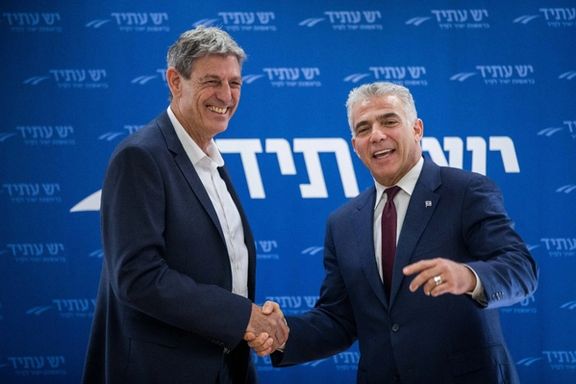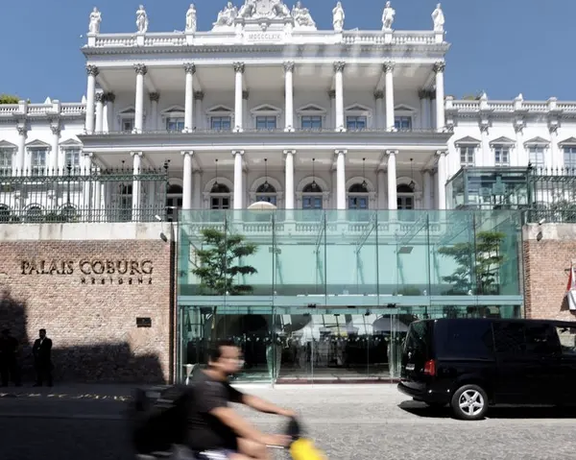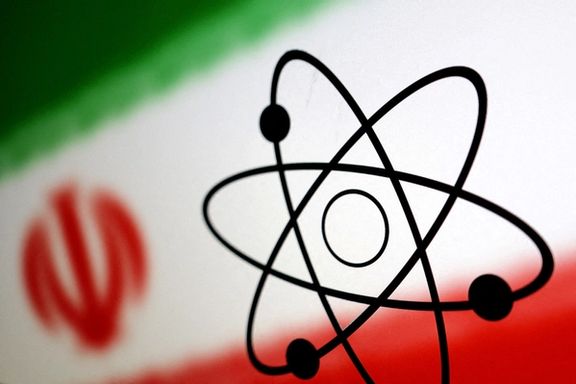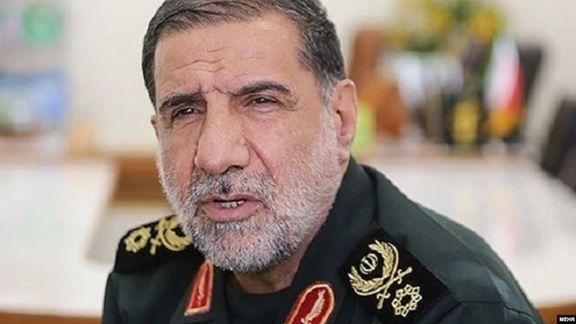Western Powers Can Get Better Iran Deal, Israeli Lawmaker Says

Israel believes Western powers can reach a better nuclear deal with Iran, a senior lawmaker said on Friday, as attempts to revive a 2015 pact continue with no final deal yet.

Israel believes Western powers can reach a better nuclear deal with Iran, a senior lawmaker said on Friday, as attempts to revive a 2015 pact continue with no final deal yet.
"We must draft a much better deal with a much longer stick. And this is what we're not seeing," Ram Ben-Barak, head of parliament's foreign affairs and defense committee, said in a radio interview in Israel.
Tehran's insistence that the International Atomic Energy Agency (IAEA) close its probes into uranium traces found at three undeclared sites before the nuclear pact is revived is one key hurdle.
After 16 months of indirect talks between Tehran and Washington, the European made a proposal in August but key differences remain between Iran and the US.
The open probes and future inspection were Israel's main concerns with the current deal, Ben-Barak said.
"We must get honest and real answers about what they did there," he said.
Ben-Barak, who once served as deputy director of Israel's Mossad spy agency, said Iran is not as strong as some people may think and has been struggling under sanctions. This could lead Tehran to give up on its nuclear ambitions entirely, whether by diplomacy or military power, he added.
Israel has pledged never to allow Iran to obtain atomic weapons, saying Tehran advocates its destruction. Iran denies ever seeking nuclear arms.
"What Israel wants is something better in place of this deal. Something better means telling the Iranians 'listen, you will not have a nuclear program'," he said.
Reporting by Reuters

Following the recent escalation of Israeli strikes against Iran-linked targets in Syria, Russia has asked the Islamic Republic to withdraw from military positions in western and central Syria.
London-based newspaper Asharq Al-Awsat quoted unnamed Syrian sources as saying on Friday that Moscow has demanded Iranian-backed militias to evacuate positions west of Syria’s Hama province as well as from positions in the central and western parts of the country.
According to the report, Russia’s call is meant to deprive Israelis of excuses or pretexts to continue the bombing of targets where Russian forces are present.
“Russian officers informed the Iranian side of the need to evacuate Iranian military headquarters near the site of Regiment 49, which belongs to the Syrian regime forces,” a source told the paper, adding that the demand was made during a meeting that included three Russian officers and their Iranian counterparts on Wednesday.
The Regiment 49 site is one of the most important military sites in western Hama as it houses long-range S-200 missiles and other Russian-made military equipment.
“The Russian officers also demanded that the Iranians evacuate a second military site in the Hamidiya area, south of Tartus governorate on the Syrian coast,” the source added.
Following Israeli airstrikes on targets around Aleppo and Damascus in Syria, Foreign Minister Faisal Mekdad said on Thursday that Israel was "playing with fire," noting that "Syria will not remain silent regarding the repeated Israeli attacks and the Israelis will pay the price sooner or later."
Israel conducted several airstrikes against the Aleppo International Airport in northwestern Syria, hours before its missiles struck targets southeast of capital Damascus Wednesday night.

An explosion rocked Iran’s and Middle East’s oldest oil refinery in southwestern city of Abadan in the oil-rich Khuzestan province overnight, state media reported on Friday.
According to the government’s official news website, IRNA, the blast was caused by the bursting of one of the furnaces of the sulphur production unit of phase three of Abadan Oil Refinery during the start-up operation, causing a huge explosion.
The blast apparently had no casualties, and IRNA claims that production at the refinery continues as usual.
This is the second incident at the Abadan refinery, which supplies around 25 percent of the country’s fuel needs, this year. In April, a section of the refinery caught fire but the blaze was contained with no fatalities or injuries.
Abadan, near the Persian Gulf coast, is Iran’s largest refinery with a daily capacity of 430,000 barrels of crude, producing liquefied petroleum gas, gasoline, kerosene, gas oil, jet fuel, furnace oil, bitumen, petroleum solvents, sulfur, and naphtha. Abadan refinery, opened in 1912 by the Anglo-Persian Oil Company originally as a pipeline terminus, quickly became one of the world's largest refineries and was an important supplier to the British military.
Several explosions and fires in Iranian military and industrial sites − including pipelines and refineries − since mid-2020 have not been fully explained by authorities. However, they have blamed Israel for a series of spectacular sabotage attacks on nuclear facilities, including two explosions at Natanz uranium enrichment center. Israel has not taken responsibility for any incident.

The United States took a “hasty” step by calling Iran’s latest response in the nuclear talks “not constructive”, the official government news website IRNA said on Friday.
In a long unsigned article, IRNA insisted that Iran’s positions in the nuclear talks have not changed and quoted remarks by President Ebrahim Raisi made earlier in the week. It said the president had insisted on four conditions: Removing United States’ sanctions, verification, reassuring guarantees and shelving IAEA demands on safeguards.
Recent optimistic assessments tended to assume that agreement was reached on most of these issues, except the demand of the International Atomic Energy Agency to receive satisfying answers from Tehran on its past undeclared nuclear activities.
IRNA said that based on the four conditions Iran sent its response on Thursday to the EU coordinator of the talks, Enrique Mora and hours later the United States in a “hasty” move called Iran’s response “not constructive”. It claimed that earlier Western sides had agreed that Iran’s demands on lifting sanctions and closing the IAEA file were reasonable.
IRNA specifically cited comments by European Union foreign policy chief Josep Borrell on August 22 that had called Iran’s earlier response of August 15 “reasonable”.
The article concluded by saying that the delay in an agreement is solely due to “America’s internal problems” and “weakness in the Biden Administration's decision making.”
President Joe Biden faces domestic opposition to reviving the JCPOA, but Iran has also insisted on concessions that in some cases go beyond the JCPOA framework.

An advisor to Iran’s negotiating team has criticized Washington’s reaction to Tehran’s latest position on reviving the 2015 nuclear deal, saying for the US "constructive" means accepting its terms.
Mohammad Marandi, who acts as de facto spokesman for the Islamic Republic’s nuclear negotiating team, said in a tweet on Friday that “It's time for the Biden team to make a serious decision.”
Noting that If the United States makes “the right decision, an agreement can be swiftly concluded,” he said that “For the US 'constructive' usually means accepting US terms; for Iran it means a deal that is balanced and protected.”
Iran’s Foreign Ministry spokesperson Nasser Kanaani said early on Friday that Tehran has sent a "constructive" response to US proposals, but the US State Department gave a different assessment.
"We can confirm that we have received Iran's response through the EU," a White House National Security Council spokesperson Adrienne Watson said. "We are studying it and will respond through the EU, but unfortunately it is not constructive,” adding that "Some gaps have closed in recent weeks, but others remain."
Also on Friday, Tasnim news, affiliated with the Revolutionary Guard, quoted Ebrahim Azizi, the deputy chairman of the Iranian Parliament's National Security and Foreign Policy Committee, as saying that the US should decide whether it wants to finalize the agreement or not. “Iran's most important demand is economic benefit,” he said, reiterating that “the safeguard issues must be also resolved and all allegations about Iran's nuclear issue must be dropped.”

A hardliner lawmaker in Tehran, IRGC General Mohammad Esmail Kowsari, has threatened that Iran can boost Uranium enrichment to weapons grade 93 percent purity.
Iranian analysts speaking to Iran International TV said that they believe the threat is aimed at making the United States even more eager than before to forge an agreement with Tehran.
Kowsari said in his remarks, as reported by Etemad Online, that Iran can boost uranium enrichment from the current 60 percent to the bomb-grade 93 percent. He added that it is the United States that needs Tehran and not vice versa.
Meanwhile, he denied that Iran's ailing economy badly needs the benefits of an agreement that would lift sanctions on its oil exports and international banking.
In another development, conservative website Nameh News wrote in a commentary on September 1, that although officials and media on both sides are hopeful, it is unlikely that an agreement can be concluded in the next few days. However, the commentary reminded that the delay would lead to losses for Iran, for which the opponents of agreement should be held accountable.
Nameh News said many in Iran believe that President Ebrahim Raisi's comments in a press conference earlier this week could be taken as an early "No" to an agreement.

Iran submitted its response late on September 1 and a US official’s first response was that Tehran’s reply was “not constructive”.
The commentary also reminded that Israeli's are working hard in the meantime to dissuade the United States from signing a deal to revive the 2015 nuclear deal, JCPOA. The commentary further claimed that France is also against a nuclear agreement with Iran and is trying to obstruct the deal. The website claimed that if an agreement is made, Iran will be able to export 2.5 million barrels of oil per day and earn $7.5 billions per month.
Rouydad24, another Iranian website claimed based on Israeli media reports that the new agreement is a weaker document than the original 2015 deal. The website argued that difference between the new and old agreements is not simply about a change in political situation, but it is also the fact that the new version is not as strong as ‘JCPOA-1’.
The website also wrote that the fast-changing international political situation has cast a shadow of doubt on the fate of the agreement, and it is difficult to make a prediction with a good degree of certainty. What is certain, wrote Rouydad24, is that currently more observers who believe the JCPOA can be revived only if a dead man can be returned to life. The website called the revival of the nuclear deal "a fantasy."
The website added that any agreement, if and when it is reached, will not be something like a JCPOA-2. It will certainly be a new deal.
Meanwhile, proreform news website Fararu wrote that given the existence of numerous differences and disputes between Iran and the United States, a stand-alone nuclear deal cannot be long-lasting.
“Even if this happens, as in 2015, it will only be an expression of tactical tolerance of the other side, and the foundations of such an agreement will be shaky. Chances of Iran and the US reaching a sustainable agreement will remain very low as long as the problems between them are not addressed in a fundamental manner,” Fararu said.